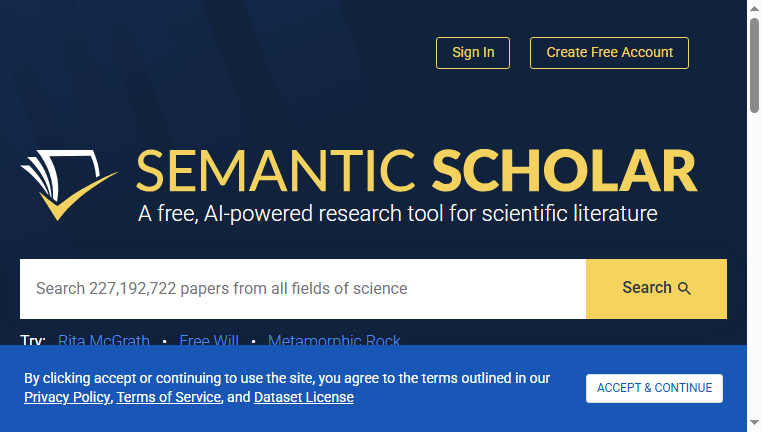Semantic Scholar
Semantic Scholar is a powerful research tool that empowers users to explore over 220 million scientific publications using a sophisticated AI-driven search engine. It provides developers with a robust API to access a vast repository of academic literature and gain insights. Researchers can easily find relevant papers across various fields, streamlining their literature review process, thus enhancing productivity and knowledge acquisition.
What you can do with Semantic Scholar and why it’s useful
◆Main Functions and Features
・Semantic Search Engine.
The AI-driven search engine analyzes user queries and retrieves relevant scientific publications by understanding context and semantics. This enhances the accuracy of search results.
・Extensive Database Access.
Users gain access to a collection of over 220 million scientific papers, covering various disciplines, enabling comprehensive research findings.
・Citation Graphs.
The tool provides visual citation graphs, allowing users to explore relationships between papers and authors, facilitating understanding of academic influence and trends.
・API for Developers.
Developers can leverage Semantic Scholar's API to integrate advanced research functionalities into their applications, enhancing user experience with academic content.
・Personalized Recommendations.
Users receive tailored paper suggestions based on their reading history, ensuring relevant literature is highlighted for efficient research.
・Paper Summaries.
Each publication includes a summary, allowing users to gauge content relevance quickly and decide whether to dive deeper into the study.
◆Use Cases and Applications
・Academic Research.
Facilitate in-depth exploration of scientific papers across diverse fields, supporting thorough literature reviews for scholarly work and thesis preparation.
・Collaborative Projects.
Researchers can utilize the platform for collaborative studies, sharing findings and insights easily to drive joint research efforts.
・Trend Analysis.
With access to citation graphs, users can analyze trends within specific research areas, helping identify emerging fields and popular topics.
・Literature Review.
Streamline the literature review process by quickly accessing relevant papers and evaluating their significance through structured summaries.
Copyright © 2026 AI Ranking. All Right Reserved

